One of the most exciting aspects of the CAFF Farm School is the diversity of students’ backgrounds and reasons for enrolling. As these new farmers bring their farm visions to fruition, their communities will be enriched. Melanee is an excellent example. She currently operates two small private schools in Fayetteville; Parkside Playschool for babies through Pre-K and Fayetteville Nature School, focusing on a holistic approach for elementary students through the fifth grade.
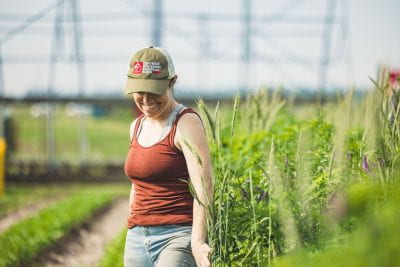 Melanee enrolled in the CAFF Farm School to develop an urban micro-farm on an under utilized half-acre on her school’s property. The project, dubbed Hide and Seek Farm, will provide learning opportunities for her young charges and nutritious food for school meals. The school currently serves organic food and places a standard grocery order each week. Melanee hopes to grow much of the school’s food in the future. (See @hideandseekmicrofarm on Instagram)
Melanee enrolled in the CAFF Farm School to develop an urban micro-farm on an under utilized half-acre on her school’s property. The project, dubbed Hide and Seek Farm, will provide learning opportunities for her young charges and nutritious food for school meals. The school currently serves organic food and places a standard grocery order each week. Melanee hopes to grow much of the school’s food in the future. (See @hideandseekmicrofarm on Instagram)
She prioritizes healthy organic food at home too. Eating an organic, primarily plant-based, diet and cooking from scratch is something her family deeply values. This naturally led Melanee to try organic gardening at home. She says she failed at it repeatedly, and her small garden bed for the school wasn’t productive either. After these multiple failures, Melanee concluded she must have the proverbial black thumb rather than a green one. “At first, I blamed the soil,” she says, laughing “but my daughter planted some pumpkin seeds in the same spot, and they grew into lovely pumpkins. I could no longer fault the dirt and concluded it must be me!” In her defense, it actually could have been the dirt. Soil health is an essential aspect of a thriving farm.
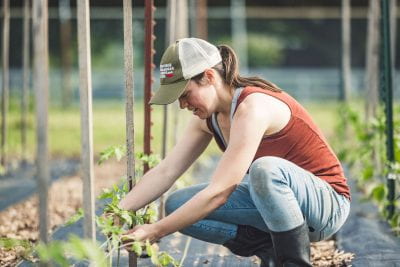 Melanee grew up in Arkansas and then served in the U.S. Air Force. After separating from the military, she worked in an elementary school kitchen, attended culinary school, and owned a specialized bakery for a while before opening her schools. After the birth of her third child, the energetic mom took an extended leave of absence to contemplate her next big venture. In addition to nurturing children, she had always been interested in plants. She wanted to grow food to feed her family. On her hiatus, Melanee realized she still wanted to do that and was tired of failing. The micro-farm idea coalesced, and she researched her education options for permaculture classes.
Melanee grew up in Arkansas and then served in the U.S. Air Force. After separating from the military, she worked in an elementary school kitchen, attended culinary school, and owned a specialized bakery for a while before opening her schools. After the birth of her third child, the energetic mom took an extended leave of absence to contemplate her next big venture. In addition to nurturing children, she had always been interested in plants. She wanted to grow food to feed her family. On her hiatus, Melanee realized she still wanted to do that and was tired of failing. The micro-farm idea coalesced, and she researched her education options for permaculture classes.
While looking into farming opportunities for veterans, she discovered the Center for Arkansas Farms and Food. Their CAFF Farm School program was comprehensive, local, and took less than a year. It was also a part-time program at 20 hours per week and not too expensive. It made the most sense and fit for her lifestyle.
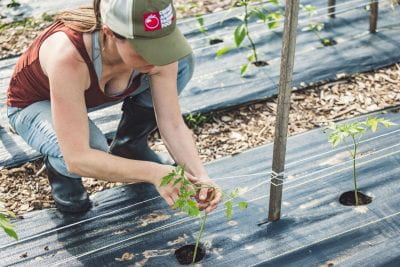 Melanee says she loves the CAFF Farm School program. “I enjoy being outside as part of the workday. And it’s fun to think about what we are planting and all the food we’re growing ourselves. It gives me ideas. I can imagine what I might grow at my micro-farm venture.”
Melanee says she loves the CAFF Farm School program. “I enjoy being outside as part of the workday. And it’s fun to think about what we are planting and all the food we’re growing ourselves. It gives me ideas. I can imagine what I might grow at my micro-farm venture.”
Based on what she’s learned, she thinks anyone interested in farming should “Just try it! Talk to farmers at the local markets. Most are passionate and willing to share their knowledge. If you can, enroll in CAFF Farm School or apply for a paid CAFF Farm Apprenticeship. You can benefit from any type of farm mentorship that provides an opportunity to get your hands dirty while learning.”
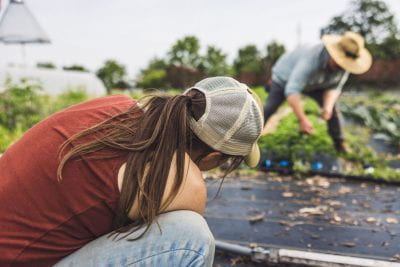 Melanee gets excited thinking about what her tiny farm will blossom into. She considers it her practice farm and is focused on building the soil, having learned the importance of soil health in her CAFF classes. Although her micro-farm vision is still in formation, some of her goals for the future are clear. She wants to help serve the community by feeding it. And to feed her family organically-grown nutritious food. She also wants her farm to be gentle to the earth, regenerative, and plastic-free as possible.
Melanee gets excited thinking about what her tiny farm will blossom into. She considers it her practice farm and is focused on building the soil, having learned the importance of soil health in her CAFF classes. Although her micro-farm vision is still in formation, some of her goals for the future are clear. She wants to help serve the community by feeding it. And to feed her family organically-grown nutritious food. She also wants her farm to be gentle to the earth, regenerative, and plastic-free as possible.
Melanee has discovered that the difference between a black thumb and a green one is knowledge, hard work, and healthy soil.
CAFF Farm School is an 11-month program that teaches regenerative farming methods at the CAFF teaching farm in Fayetteville, Arkansas. The curriculum includes field production and farm entrepreneurship, including courses in legal, business, and marketing. Students who complete the program will have a farm business plan and the skills to make it a reality. The Center for Arkansas Farms and Food is part of the University of Arkansas System, Division of Agriculture. Apply from July 1- August 30th at LearnToFarm.org
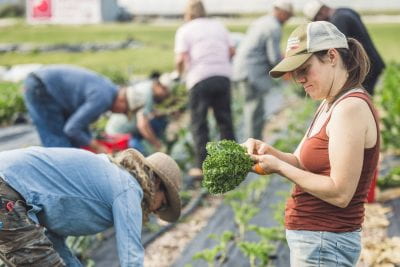

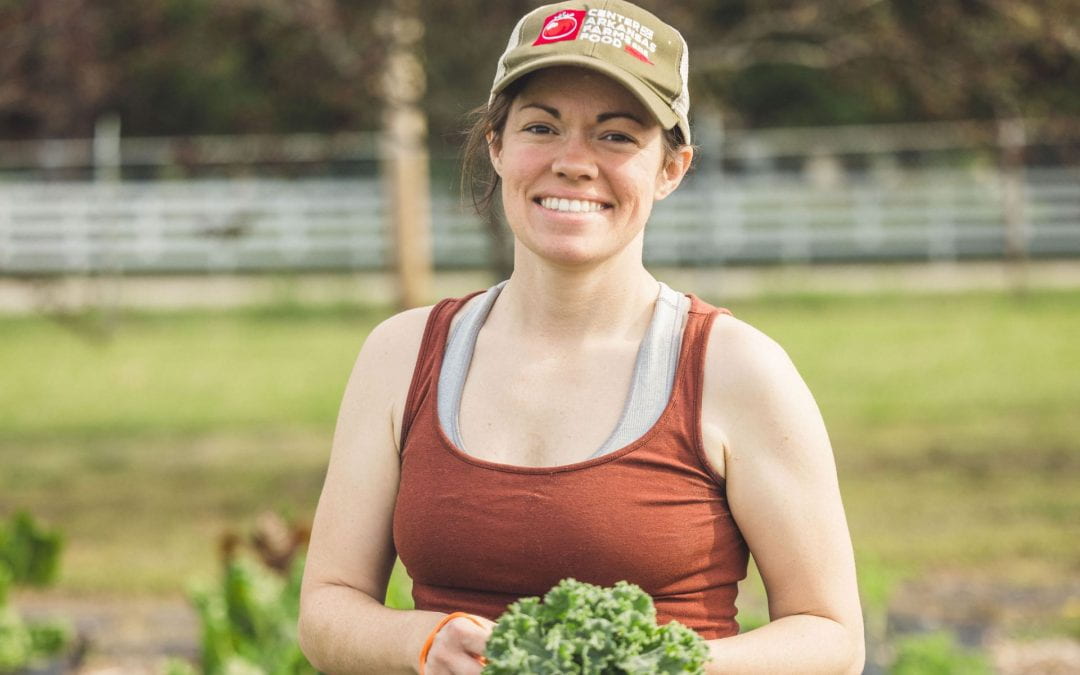
Recent Comments